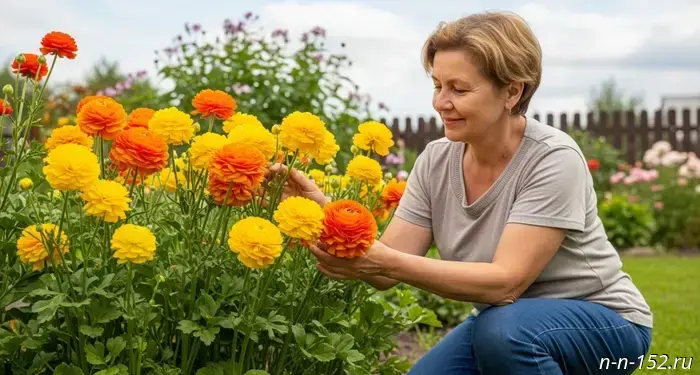
Instead of the usual petunia — definitely plant this perennial — vibrant flowers with a scent detectable from 2 km away. An ornament for your site.
AI Photo prodzer.ru
Secrets of Successful Ranunculus Cultivation from an Experienced Gardener
Understanding anthesis in garden roses and delphiniums is a key aspect of successful horticulture, as it determines the aesthetic value of these plants through flowering. Despite superficial similarities during periods of abundant bloom, the biological mechanisms and cultivation requirements of roses and delphiniums differ significantly, directly affecting their growing and care methods within botany and agriculture.
As a symbol of culture and gardening, rose cultivation requires a careful approach to bud formation and blooming, which is an expression of anthesis. To achieve abundant and prolonged flowering, garden roses need balanced nutrition, adequate lighting, and pest protection, notes botanist Professor Sergey Kovalev.
Meanwhile, delphiniums, with their majestic inflorescences, display a different type of anthesis, where each flower opens sequentially, extending the overall decorative period. This plant, like the rose, is ornamental, but its root system and moisture needs differ. For example, delphiniums prefer wetter but well-drained soils, whereas roses are sensitive to root overwatering. These habitat requirement differences highlight the importance of understanding each species' unique characteristics for effective gardening.
Agriculture and private farms actively utilize this knowledge to optimize yield and ornamental appeal. Interestingly, some drought-resistant rose varieties can exhibit longer anthesis under limited watering conditions due to years of selective breeding. Similarly, delphinium hybrids resistant to fungal diseases have been developed, prolonging their flowering even in adverse conditions.
Knowledge of these nuances enables gardeners to create harmonious compositions where roses and delphiniums complement each other despite differences, ensuring continuous flowering throughout the warm season. It is also crucial to consider not only external factors but internal biochemical processes during anthesis, such as pigment production responsible for flower coloring. This understanding allows for appreciating the beauty while consciously managing cultivation to maximize each plant's potential.
Using organic fertilizers, such as humus or compost, promotes the development of a robust root system in both plants, directly impacting flower quality and longevity. Additionally, for stimulating re-blooming in some rose and delphinium varieties, pruning of faded inflorescences is employed to redirect the plant's energy toward new bud formation.
Thus, successful rose and delphinium cultivation requires a deep understanding of their biological features, including anthesis processes, and tailoring care methods to individual plant needs. Ultimately, this ensures lush and prolonged blooming.
Другие Новости Нижнего (Н-Н-152)
 The architecture of the first house on Samochkina was approved by the Nizhny Novgorod Mingroup.
The architecture of the first house on Samochkina was approved by the Nizhny Novgorod Mingroup.
 Two young residents of Nizhny Novgorod died in a motorcycle crash in the Volodarsky district.
Two young residents of Nizhny Novgorod died in a motorcycle crash in the Volodarsky district.
 The region will allocate 71 million rubles for the resettlement of three buildings in Studenoy Quarter.
The region will allocate 71 million rubles for the resettlement of three buildings in Studenoy Quarter.
 "Replacing the intercom" cost a resident of Nizhny Novgorod 14 million rubles.
"Intercom replacement" cost the resident of Nizhny Novgorod 14 million rubles.
It all started with a phone call supposedly from a neighbor — the woman reported the replacement of the front door and the intercom in the building. July 19, 2025. GTRK Nizhny Novgorod. Nizhny Novgorod region. Nizhny Novgorod.
"Replacing the intercom" cost a resident of Nizhny Novgorod 14 million rubles.
"Intercom replacement" cost the resident of Nizhny Novgorod 14 million rubles.
It all started with a phone call supposedly from a neighbor — the woman reported the replacement of the front door and the intercom in the building. July 19, 2025. GTRK Nizhny Novgorod. Nizhny Novgorod region. Nizhny Novgorod.
 The youth of Nizhny Novgorod "Chayka" has begun preparing for the new season.
The youth of Nizhny Novgorod "Chayka" has begun preparing for the new season.
 Replacing the intercom cost a Nizhny Novgorod pensioner 14 million rubles.
Replacing the intercom cost a Nizhny Novgorod pensioner 14 million rubles.
Instead of the usual petunia — definitely plant this perennial — vibrant flowers with a scent detectable from 2 km away. An ornament for your site.
Photo AI prodzer.ru Secrets of successful dahlias cultivation from an experienced gardener Understanding the antiza in garden roses and geraniums is a key aspect of successful gardening, 07/19/2025. ProDzer.Ru. Nizhny Novgorod Region. Dzerzhinsk.
